Rights and Accountability 6 August 2014

Mourners carry the bodies of three Palestinians slain by Israeli forces in Beit Ommar village near Hebron on 25 July.
APA imagesTwo Palestinians were unlawfully killed by Israeli soldiers at during a protest in the occupied West Bank village of Beit Ommar on 25 July, an investigation by Human Rights Watch has found.
A third man killed at the protest “also appeared to have been killed unlawfully,” the rights group states.
Human Rights Watch’s status of the third man seems to be different because witnesses say he was throwing stones when he was fired on, though the New York-based group concedes “he was 35 meters away when he was shot and could not have posed an imminent deadly threat to Israeli forces.”
This qualifier is dubious at best, given that Palestinians defending themselves with rocks hardly justifies lethal use of force by the invading and occupying Israeli military.
Human Rights Watch again uses cautious language when it states: “Some offenses by Israeli forces in the West Bank as part of their occupation could be subject to prosecution as war crimes.”
This tip-toeing language is jarring when compared to the violent reality in the Israeli-occupied West Bank this summer.
Collective punishment
During the month of June, Israel launched its largest military assault on the occupied West Bank in more than a decade, invading refugee camps, villages and cities across the territory. Six Palestinians were killed by Israeli forces during the military operation, all of them civilians. Hundreds were arrested, universities were raided and soldiers stole Palestinian property worth $3.5 million.
The pretext for the assault was the disappearance of three Israeli youths who were hitchhiking between settlement colonies in the West Bank on 12 June. It was later revealed that the Israeli police, intelligence officials and the prime minister knew within hours of the kidnapping that the teens had been killed.
Following the campaign of collective punishment and the discovery of the teens’ bodies on 30 June, the Israeli government, starting with Prime Minister Benjamin Netanyahu at the top, fanned calls for retribution and revenge for the teens’ deaths.
On 2 July, sixteen-year-old Muhammad Abu Khudair was abducted near his home in the Shuafat neighborhood of eastern occupied Jerusalem. His body was found hours later in a Jerusalem forest; a preliminary autopsy indicated that the boy was burned alive.
Three Jewish Israelis confessed to the brutal crime and reenacted it for investigators.
Meanwhile, mobs of Israeli youths continue to roam the streets of Jerusalem looking for Palestinians to attack. Two twenty-year-old Palestinians were recently beaten unconscious by youths wielding iron bars and baseball bats.
Palestinians in Jerusalem live in fear of being the next victims in an increasingly violent environment.
Killings across West Bank
Elsewhere in the occupied West Bank, at least seventeen Palestinians have been killed by Israeli forces and civilians since the beginning of the military’s slaughter in the Gaza Strip on 7 July.
Palestinian rights group Al-Haq has investigated and summarized the circumstances of each killing, painting a picture of an army bound by no restraints on the use of force.
The victims include:
- Mahmud Hatem Shawamra (27) of the al-Ram neighborhood of Jerusalem, shot dead by three live bullets after throwing a Molotov cocktail at an army jeep on 21 July.
- Mahmud Saleh Hamamra (33) of Husan village near Bethlehem, shot in front of his wife and small child outside his shop by invading soldiers who had situated themselves next to his store on 21 July.
- Muhammad Qasem Hamamra (20), also of Husan village, shot in the head by a live bullet from a distance of one meter, after clashes erupted following Mahmud Hamamreh’s funeral on 22 July. An eyewitness told Al-Haq that Israeli soldiers fired bullets into the air for no apparent reason during the funeral procession. During confrontations with protesters following the funeral, no gunshots were heard. “As Muhammad was killed by live fire, it is assumed that the Israeli soldiers used a sound suppresser when firing the bullets,” Al-Haq states.
- Muhammad Zeyad Araj (17), shot with live fire in the head, thigh and arm during the #48KMarch mass protest which set out from al-Amari refugee camp in Ramallah and marched on to Qalandiya checkpoint on 24 July. “That night, there were more than 142 people wounded with live bullets,” states Al-Haq.
- Eid Rabbah Fudeilat (28), shot by eleven live bullets in the legs, shoulder and in the back in al-Arroub refugee camp in Hebron on 25 July. In the time preceding Eid’s shooting, his brothers had called him to ask him to intervene with soldiers who were firing on demonstrators; the fire was preventing them from reaching their home. Eid approached the soldiers and got into an argument with one. “A soldier pushed Eid, who responded by punching the soldier several times. He then ran away to where his brothers and nephew were. When Eid had run about 10 metres away from the soldiers, they opened fire in his direction. Eid fell forward onto his face approximately 40 metres away from his house,” according to Al-Haq.
- Basem Sati Abul Rub (19), shot in the center of his chest with a live bullet while throwing stones at soldiers near al-Jalameh checkpoint north of Jenin city on 25 July. Al-Haq states: “According to Al-Haq’s field researcher, there were 27 people at the hospital that had been injured at the protest. Most were injured in the lower parts of the body and had been hit with live bullets. According to witnesses, the sound of live bullets during the protest was rare. However, due to the number of injuries caused by live bullets, it is suspected that the Israeli forces used a sound suppressor when firing bullets.”
- Khaled Azmi Odeh (20), shot with a live bullet by a motorist driving an Israeli-plated civilian car near Huwwara checkpoint outside the city of Nablus on 25 July.
- Tayyeb Saleh Shihada (21) was wearing a mask and throwing stones at Israeli soldiers at Huwwara checkpoint on 25 July when he was shot with a live bullet in the head.
- Nasri Taqatqa (14) was shot with a live bullet in the chest during confrontations between Palestinian youths and Israeli soldiers in Beit Fajjar village near Bethlehem on 26 July.
- Alaa Jihad Ezghir (21) was declared dead on 29 July after he was injured on 23 July when he was shot in the stomach while throwing stones at soldiers at the entrance of Ithna village near Hebron.
- Oday Nafez Jabr (19), shot and left to bleed for ten minutes on 1 August after attempting to run away from an Israeli soldier who had pointed a gun in his direction during a Gaza solidarity protest in Saffa village near Ramallah. “The demonstrators had yelled at the soldiers that someone was injured but the Israeli forces continued firing tear gas and live bullets,” according to Al-Haq.
- Tamer Faraj Samur (22) was shot with a live bullet in the stomach after a peaceful demonstration escalated into confrontations near Gishori factories outside of Tulkarem on 2 August.
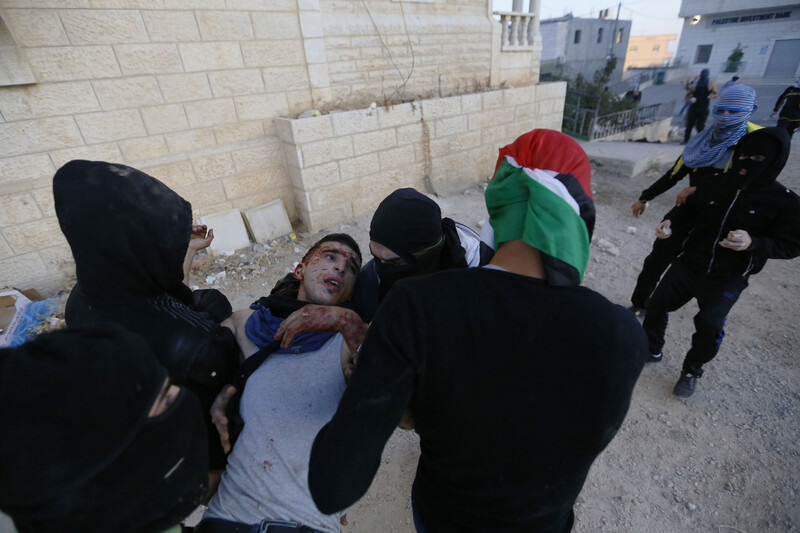
Protesters carry Muhammad Qasem Hamamra after he was shot in the head in the village of Husan on 23 July. He later died of his injuries.
ActiveStills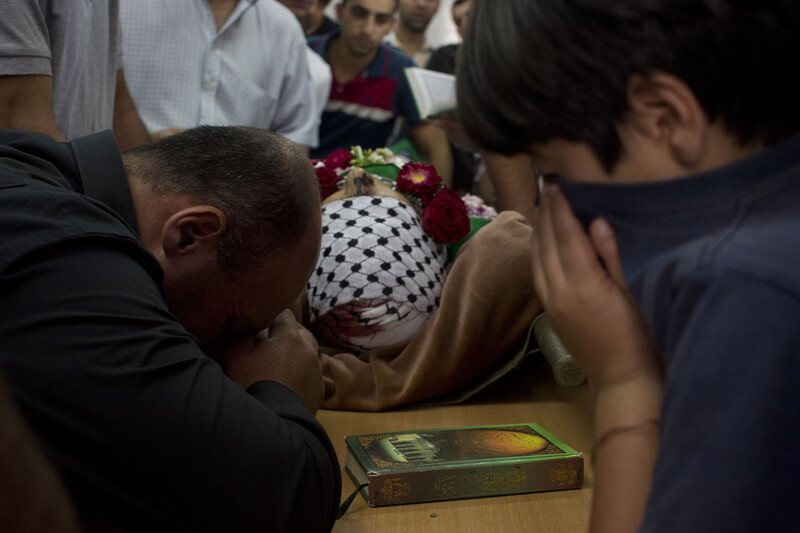
Muhammad Araj is mourned during his funeral at the Qalandiya refugee camp near Ramallah on 25 July.
ActiveStills
Relatives mourn during the funeral of Mahmud Hatem Shawamra in the West Bank town of al-Ram near Jerusalem on 22 July.
APA images
A Palestinian policeman stands next to the bodies of Khaled Azmi Odeh and Tayyeb Saleh Shihada, killed during a protest in West Bank village of Huwwara on 25 July.
APA imagesThe three men from Beit Ommar whose killings were investigated by Human Rights Watch are also among the seventeen victims.
After Friday prayers on 25 July, hundreds of Beit Ommar residents marched to an Israeli military watchtower at the village’s entrance to protest the assault on Gaza. Israeli forces pushed them back by firing teargas and rubber-coated steel bullets.
Hashem Abu Maria was attempting to cross the street after the protest had dispersed when he was shot, witnesses told Human Rights Watch.
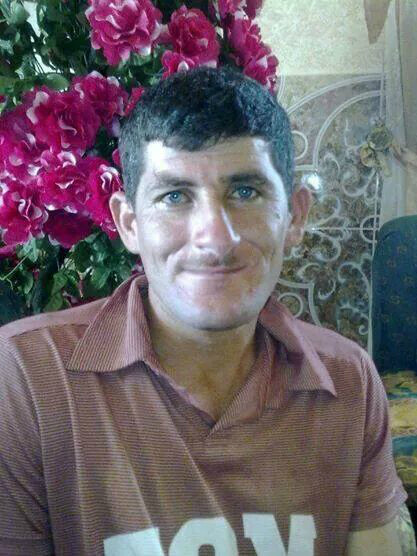
Abd al-Hamid Breigheth was shot and killed by Israeli forces on 25 July in Beit Ommar. (Photo courtesy of Palestine Solidarity Project)
Abu Maria, married with three children, was a human rights defender working with Defence for Children International Palestine.
Sultan al-Zaaqiq and Abd al-Hamid Breigheth were shot by Israeli forces about twenty minutes later, according to Human Rights Watch’s investigation.
Al-Zaaqiq was reportedly throwing stones at the soldiers from approximately 35 meters away when he was shot by live fire; Breigheth was shot in the leg and abdomen when he ran to assist al-Zaaqiq.
“In the course of half an hour in Beit Ommar, Israeli forces left three families without a father,” stated Sarah Leah Whitson, Human Rights Watch’s Middle East and North Africa director.
Evading justice
Human Rights Watch notes that the Israeli military has a poor record of bringing soldiers to justice for the use of live ammunition against Palestinian protesters who pose no threat. At least 46 Palestinians were killed in such circumstances from 2005 to early 2013, according to the Israeli human rights group B’Tselem, as mentioned in the Human Rights Watch report.
“Since September 2000, Israeli forces have killed more than 3,000 Palestinians who did not participate in hostilities in the West Bank and Gaza, according to B’Tselem’s data,” Human Rights Watch adds.
“But the military justice system has convicted only six Israeli soldiers for unlawfully killing Palestinians, with seven-and-a-half months as the longest jail sentence, according to Yesh Din, another rights group.”
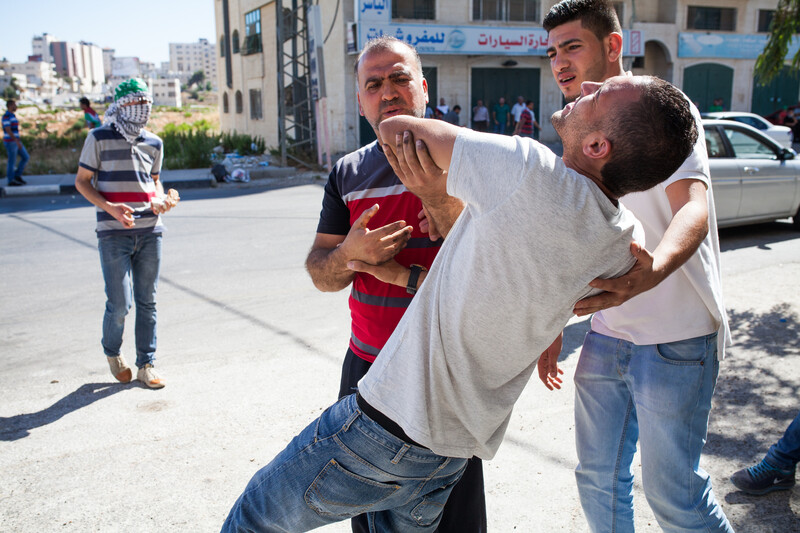
A protester falls after being shot with live ammunition by Israeli soldiers during a protest against the Israeli attack on Gaza at the DCO checkpoint near Ramallah, 25 July.
ActiveStillsEven when the willfull killing of Palestinian children is caught on video, Israeli soldiers are able to evade justice.
Security cameras owned by a local shopkeeper recorded the shootings of Palestinian boys Nadim Nuwara, 17, and Muhammad Abu al-Thahir, 16, at a demonstration near the Ofer military prison in the occupied West Bank village of Beitunia on 15 May.
The footage released by Defence for Children International Palestine showed the boys walking slowly in a calm scene when they were shot, posing no threat.
The Israeli military ordered the owner of the security cameras who captured the footage to dismantle his cameras and confiscated recording devices owned by other shopkeepers in the area.
Tags
- Beit Ommar
- Human Rights Watch
- war crimes
- collective punishment
- Muhammad Abu Khudair
- incitement
- racism
- West Bank
- Al-Haq
- Mahmud Hatem Shawamra
- Mahmud Saleh Hamamra
- Muhammad Qasem Hamamra
- Husan
- Muhammad Zeyad Araj
- #48kmarch
- Eid Rabbah Fudeilat
- Arroub refugee camp
- Basem Sati Abul Rub
- Jalameh checkpoint
- Khaled Azmi Odeh
- Tayyeb Saleh Shihada
- Nasri Taqatqa
- Alaa Jihad Ezghir
- Oday Nafez Jabr
- Tamer Faraj Samur
- Hashem Abu Maria
- Defence for Children International-Palestine Section
- Sultan al-Zaaqiq
- Abd al-Hamid Breigheth
- Impunity
- Nadim Siam Nuwara
- Muhammad Abu al-Thahir




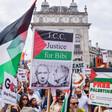

Comments
Israel's brutality Book
Permalink robert epperly replied on
Anyone that would like a copy of my book emailed to them please email me at epperlyrobert@yahoo.com. The Story takes place mostly in Israel and speaks the truth from interviews that I have done as well as solid research.
Munir Ahmad Badareen
Permalink Yasir Tawfeeq replied on
Munir Ahmad Badareen was killed in 14 July by live bullets near Hebron.